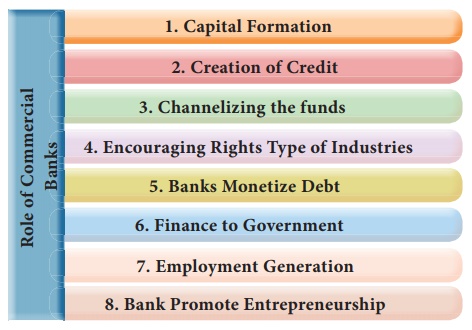Banking - Role of Commercial Banks in Economic Development of a Country | 12th Economics : Chapter 6 : Banking
Chapter: 12th Economics : Chapter 6 : Banking
Role of Commercial Banks in Economic Development of a Country
Role of Commercial Banks in Economic Development of a Country
1. Capital Formation
Banks play an important role in capital formation, which is essential for the economic development of a country. They mobilize the small savings of the people scattered over a wide area through their network of branches all over the country and make it available for productive purposes.
Now -a-days, banks offer very attractive schemes to induce the
people to save their money with them and bring the savings mobilized to the
organized money market. If the banks do not perform this function, savings
either remains idle or used in creating other assets,(eg.gold) which are low in
scale of plan priorities.
2. Creation of Credit
Banks create credit for the purpose of providing more funds for
development projects. Credit creation leads to increased production,
employment, sales and prices and thereby they bring about faster economic
development.
3. Channelizing the Funds towards Productive Investment
Banks invest the savings mobilized by them for productive
purposes. Capital formation is not the only function of commercial banks.
Pooled savings should be allocated to various sectors of the economy with a
view to increase the productivity. Then only it can be said to have performed
an important role in the economic development.
4. Encouraging Right Type of Industries
Many banks help in the development of the right type of industries
by extending loan to right type of persons. In this way, they help not only for
industrialization of the country but also for the economic development of the
country. They grant loans and advances to manufacturers whose products are in
great demand. The manufacturers in turn increase their products by introducing
new methods of production and assist in raising the national income of the
country. Sometimes, sub-prime lending is also clone. That is how there was an
economic crisis in the year 2007-08 in the US.
5. Banks Monetize Debt
Commercial banks transform the loan to be repaid after a certain
period into cash, which can be immediately used for business activities.
Manufacturers and wholesale traders cannot increase their sales without selling
goods on credit basis. But credit sales may lead to locking up of capital. As a
result, production may also be reduced. As banks are lending money by
discounting bills of exchange, business concerns are able to carryout the
economic activities without any interruption.
6. Finance to Government
Government is acting as the promoter of industries in
underdeveloped countries for which finance is needed for it. Banks provide long
-term credit to Government by investing their funds in Government securities
and short-term finance by purchasing Treasury Bills. RBI has given ₹ 68,000
crores to the government of India in the year 2018-19, this is 99% the RBI's
surplus.
7. Employment Generation
After the nationalization of big banks, banking industry has grown
to a great extent. Bank’s branches are opened frequently, which leads to the
creation of new employment opportunities.
8. Banks Promote Entrepreneurship
In recent days, banks have assumed the role of developing
entrepreneurship particularly in developing countries like India by inducing
new entrepreneurs to take up the well-formulated projects and provision of
counseling services like technical and managerial guidance.
Banks provide 100% credit for worthwhile projects, which is also
technically feasible and economically viable. Thus commercial banks help for
the development of entrepreneurship in the country.
Related Topics
